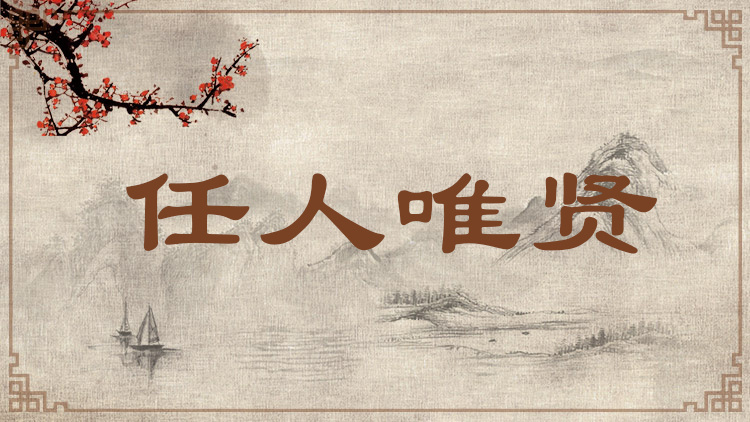任人唯贤
Appoint People Only on Their Merits

只任用德才兼备或出众的人担任官职或赋予其某种职权,即用人只以德才为标准,而不论其与自己亲疏远近。“唯”,只。“贤”,指德才兼备或出众的人,是古人所推崇的一种理想人格。只有德才兼备或出众的人才能切实践行、维护各种社会规范,引领社会发展。选拔、任用德才兼备或出众的人,让他们在国家治理中充分发挥作用,这是实现良好治理状态的重要条件或根本保障。它是中国古人所推崇和秉持的共通的用人原则,迄今仍被作为选拔、培养、使用和管理干部的基本准则。
Appoint a person to office or position based solely on merit or outstanding ability. In other words, the criteria for giving authority to a person do not involve any kind of personal relationship. Wei (唯) means "solely," and xian (贤) means a combination of ability and moral rectitude, an ideal much sought after by the ancients. Those with these qualities are able to observe and uphold social norms and be leaders of social progress. To appoint such wise and capable people to positions of power is the basis and guarantee of good governance. Such qualities, much revered in ancient times, continue to be the basic standards for selecting, training, managing and appointing public officials today.
引例 Citations:
◎任官惟贤材,左右惟其人。(《尚书·咸有一德》)
任命官员只任用德才兼备的人,身边大臣也应是忠良之人。
Only those who are both capable and upright should be appointed to official positions. High officials around the ruler should be such loyal and moral people. (The Book of History)
◎建官惟贤,位事惟能。(《尚书·武成》)
建立官职只任用有德才的人,安排吏事只选用有能力的人。
Official positions should only be filled by the moral and the upright. Official affairs should only be dealt with by those who are capable. (The Book of History)
◎古者以天下为公,唯贤是与。(《三国志·魏书·三少帝纪》)
在古时候,人们把天下看成是天下人共有之物,只推举德才兼备的人来治理。
In ancient times, it was believed that everything in the country belonged to all the people, so only the upright and capable should govern. (The History of the Three Kingdoms)
推荐:教育部 国家语委
供稿:北京外国语大学 外语教学与研究出版社
责任编辑:钱耐安





